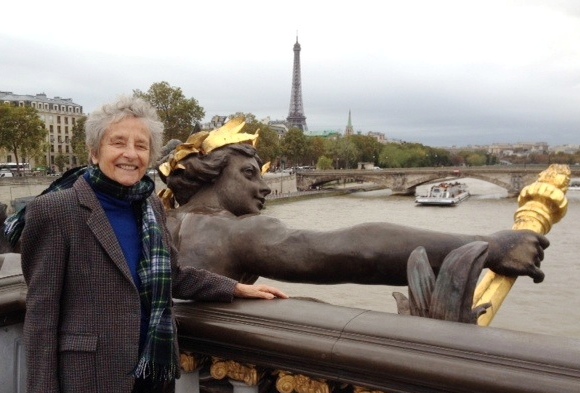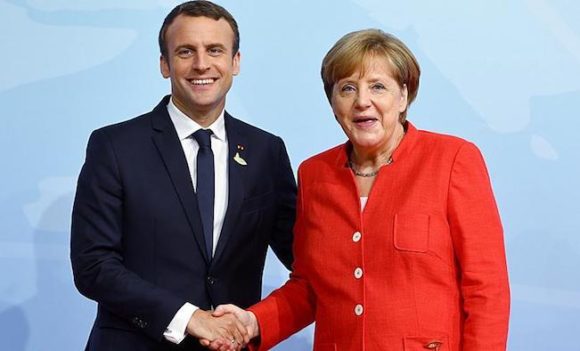
On Sept. 26, 2017, Emmanuel Macron chose the Sorbonne University to develop his grand vision for Europe. In that seminal speech he was urging his perceived partner German Chancellor Angela Merkel to join him in tackling the lofty goals of European reforms, speeding up the integration of the Eurozone through the creation of a parliament, a ministry of finances, and its own budget.
Macron proposed to strengthen the common market and reduce the economic inequalities through the harmonization of taxes, creation of a minimum wage, and reform of the “detached workers” system, which leads to employment of migrant workers at cheaper rates than would likely be available locally — a practice known as “social dumping.” His approach is based on several principles: a Europe protected by well-managed external borders and a strong defense; the opening of Europe to free trade, but with due regard for reciprocity, and solidarity among the European Union (EU) members regarding the treatment of refugees.
After an interminable six months, the “Great Coalition” between German Conservatives and Social Democrats has made it possible for Angela Merkel to start her fourth mandate. Barely a few hours after her confirmation as Chancellor on Friday, March 16, she met with French President Macron accompanied by several ministers. The speed with which she came to Paris shows how important it was for those two heads of state to get to work.

Unfortunately, the geopolitical environment allowing them to be the driving force of a dynamic Europe has shifted and even deteriorated during that long waiting period and their task has become more difficult. Merkel is politically weaker. The continent is now fragmented and the resistance from newly-created groups within the EU has become more aggressive. Macron will have to downgrade his proposals and make adjustments.
The political context in which Merkel starts her fourth mandate is quite different from the one existing in 2013. Only 52 percent of the population supported the new chancellor in 2017 versus 73 percent in the earlier elections. Compared to the consensus Merkel was able to maintain previously, it is harder now for her to keep the lid over dissenting opinions.
Even though they are part of the “Great Coalition,” several ministers stand in disagreement with the chancellor, including Olaf Scholz (social democrat or SPD), vice-chancellor and minister of finances, who believes in tightening the budget; Horst Seehofer (head of the conservative Christian Social Union or CSU in Bavaria), who was given the “super ministry” of the interior, who intends to be harsher toward the immigration policy in the name of the reactivated concept of “heimat” (homeland); Jens Spahn, 37, minister of health (Christian democratic union, CDU or Merkel’s own party), who is also a critic of Merkel’s policy on migrants, and Andrea Nahles, leader of SPD in the Bundestag, wants to rush through social reforms in favor of the workers.
Even more difficult for Merkel will be the meteoric growth of the far right party (Alternative for Germany or AfD). In 2013 it did not have enough votes to have representatives in the Bundestag. To-day AfD holds 92 seats out of 709. At a recent news cast on the ARTE channel, the violent tone of a AfD member at the Bundestag was incredible.
The “Countries of the North” (as they are now called) — Ireland, Iceland, along with the Scandinavian and Baltic states, as well as the Netherlands — believe in a strict budget and are inflexible about financial and monetary discipline. Mark Rutte, Prime Minister of TheNetherlands, speaking for the North countries , declared, “We have to adhere to the Maestrich criteria,” namely to keep the public deficit under 3 percent of the Domestic Gross Product. On March 27, for the first time in 10 years, France saw her deficit fall down to 2.6 percent. This was a significant accomplishment: France is now a credible member of the “club.”
The North countries ask that Italian and Greek banks clean up their toxic debts. A “mutualization” of the debt (particularly of Greece’s sovereign debt) and financial transfers are a red line conservative parties from Germany or Holland are not willing to cross. Like Macron and Merkel, however, Rutte sets as a priority a European Stability Mechanism (EMS) and a European Monetary Fund .
The recent Italian elections on March 8 were a blow for moderate centrists like Matteo Renzi, and the victory of two extremist, anti-system and xenophobe parties: the Five Stars (M5S) at the far left, and The League at the far right. Italy joins now the eurosceptic countries like Austria and the Visegrad group (the former Iron Curtain countries of Eastern Europe.) All these countries oppose the Macron/Merkel policies on trade, finances, democratic values and attitude toward the migrants.
Given this overview of the political landscape of Europe, it seems that the strategy of Macron and Merkel will be to start from the areas of agreement – passage toward Brexit, defense against terrorism, and protection against excessive Chinese investments in the name of the “Silk Road.”
The reactions of other EU members toward Macron’s “jupiterian” style and desire to reform are ambivalent. In a March 20 interview published by Le Monde, Xavier Bettel prime minister of Luxembourg said that a “directorate Paris-Berlin is out of the question, but added” France and Europe are lucky to have him. Even if we do not agree with all his proposals, they are most welcome.”
Editor’s Note: This is the opinion of Nicole Prévost Logan.

Nicole Prévost Logan
About the author: Nicole Prévost Logan divides her time between Essex and Paris, spending summers in the former and winters in the latter. She writes a regular column for us from her Paris home where her topics will include politics, economy, social unrest — mostly in France — but also in other European countries. She also covers a variety of art exhibits and the performing arts in Europe. Logan is the author of ‘Forever on the Road: A Franco-American Family’s Thirty Years in the Foreign Service,’ an autobiography of her life as the wife of an overseas diplomat, who lived in 10 foreign countries on three continents. Her experiences during her foreign service life included being in Lebanon when civil war erupted, excavating a medieval city in Moscow and spending a week under house arrest in Guinea.